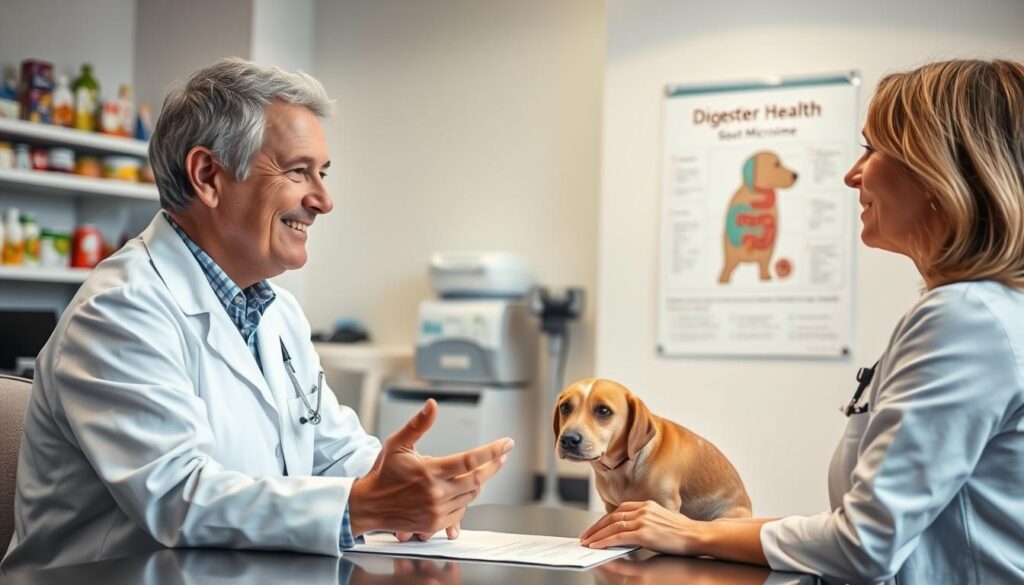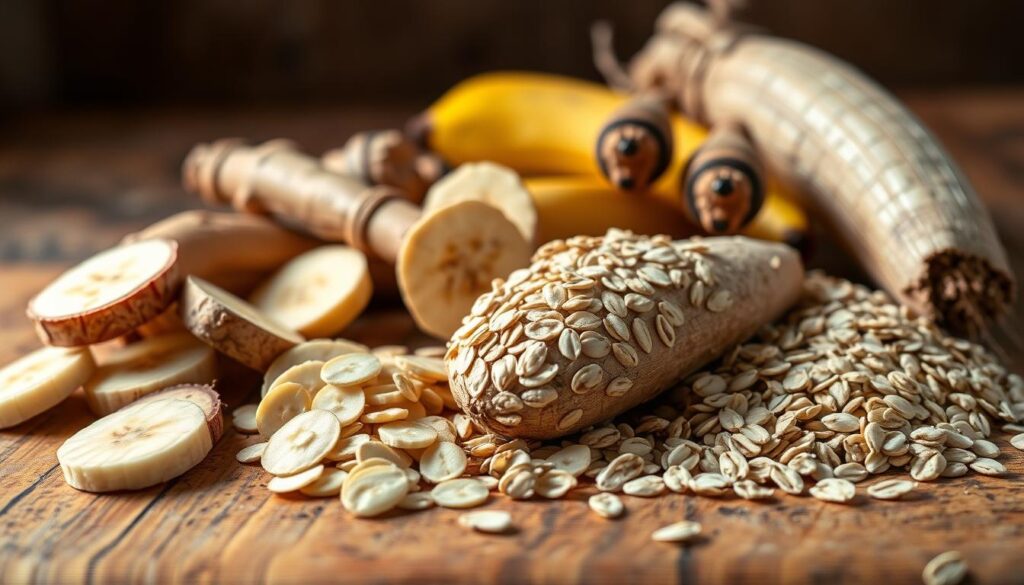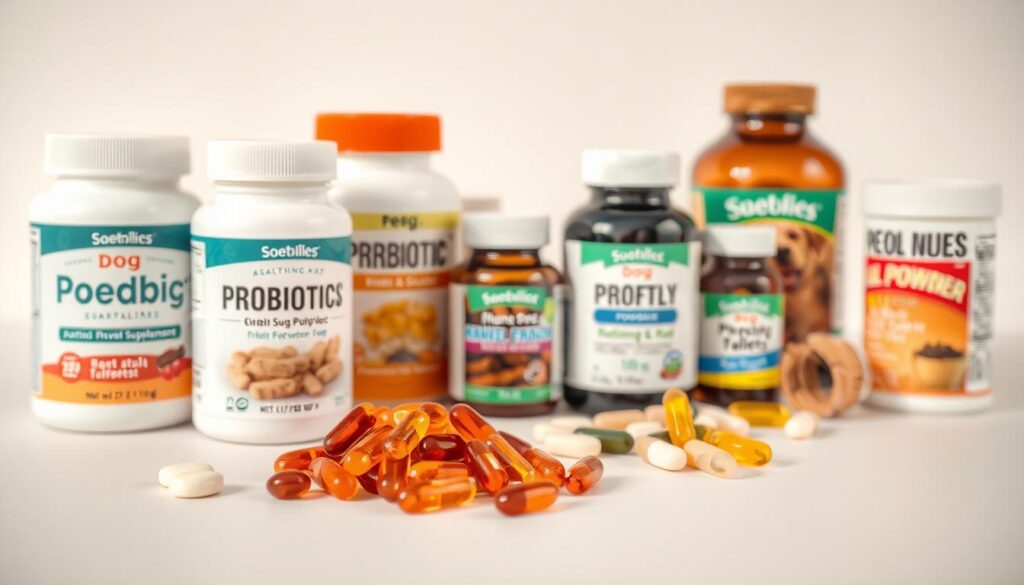A healthy gut is key to your furry friend’s well-being. Probiotics for dogs are important for a balanced gut. They help with digestive health and boost immunity.
Did you know over 70% of a dog’s immune system is in their digestive tract? Probiotics keep this system healthy. This ensures your pup stays happy and healthy.
Probiotics add good bacteria to your dog’s gut. This helps keep the gut flora balanced. A balanced gut is key for absorbing nutrients and a strong immune system.
Key Takeaways
- A healthy gut microbiome is vital for your dog’s health.
- Probiotics support digestive health and boost immunity in dogs.
- A balanced gut flora is essential for proper nutrient absorption.
- Probiotics promote a healthy balance of gut bacteria.
- A strong immune system is vital for your dog’s well-being.
Understanding Dog Probiotics & Digestive Health
Keeping your dog’s gut healthy is key to their well-being. Probiotics are vital for this balance. They are live microorganisms that help your dog’s digestive system stay in check.
What Are Probiotics?
Probiotics are good bacteria that are like the ones in your dog’s gut. They come in supplements and some foods. They help keep the gut balanced. The main types for dogs are Lactobacillus and Bifidobacterium.
These bacteria fight off bad bacteria, reduce inflammation, and improve digestion.
How Probiotics Work in a Dog’s Digestive System
Probiotics fill the gut with good bacteria, restoring the gut’s balance. This balance is key for digestion, nutrient absorption, and a strong immune system. When it’s off, dogs can get diarrhea, constipation, and gas.
Probiotics can ease these symptoms and boost digestive health.
The gut microbiome is a complex system that’s vital for your dog’s health. Probiotics support it by:
- Improving nutrient absorption
- Making vitamins
- Boosting the immune system
- Reducing bad bacteria
Knowing how probiotics work and their benefits can help dog owners choose the right supplements for their pets.
The Canine Microbiome: A Complex Ecosystem
Understanding your dog’s gut is key to their health. The canine microbiome is a mix of good and bad bacteria. They work together to keep your dog healthy.
Good vs. Bad Bacteria in Your Dog’s Gut
Your dog’s gut is home to trillions of microorganisms. Good bacteria, like Lactobacillus and Bifidobacterium, aid in digestion and immune function. Bad bacteria can lead to health issues.
It’s important to keep a balance between good and bad bacteria. An imbalance can cause health problems. Here are some key points:
- Good bacteria aid in digestion and nutrient absorption.
- Bad bacteria can cause infections and health issues.
- A balanced gut microbiome supports a strong immune system.
Factors That Affect Your Dog’s Gut Health
Several factors can affect your dog’s gut health. These include:
- Diet: What your dog eats shapes their gut health.
- Stress: Stress can upset the balance of bacteria.
- Environment: Environmental factors can impact gut health.
- Medications: Some medications, like antibiotics, can change the gut microbiome.
By understanding these factors and taking steps to maintain a healthy balance, you can support your dog’s health.
Signs Your Dog May Need Probiotics
Probiotics can greatly help dogs with health problems. But, how do you know if your pet needs them? It’s important to recognize the signs that show your dog might need probiotics. This helps support their digestive health and overall well-being.
Digestive Issues: Diarrhea, Gas, and Constipation
Digestive discomfort often means your dog might need probiotics. Diarrhea, gas, and constipation show an imbalance in their gut. Probiotics can fix this balance, easing these symptoms and keeping their digestive system healthy. For dogs with diarrhea, probiotics can make their stool firmer and cut down on diarrhea episodes.
Skin and Coat Problems
A dog’s skin and coat reflect their internal health. Problems like itching, redness, or a dull coat might mean an imbalance in gut bacteria. Probiotics can improve your dog’s digestive system, leading to a shinier coat and less itching or irritation.
Food Sensitivities and Allergies
Dogs with food sensitivities or allergies can also benefit from probiotics. These conditions cause digestive issues, skin problems, or other symptoms. Probiotics can strengthen the gut barrier, possibly reducing reactions to food sensitivities or allergies.
By spotting these signs and using probiotics, you can actively support your dog’s health. Whether it’s through digestive health supplements for pets or natural remedies for dog digestive issues, probiotics are key to keeping your dog healthy and happy.
Key Benefits of Probiotics for Dogs
Probiotics offer many health benefits for dogs, from better digestion to a stronger immune system. They are live microorganisms that help the host stay healthy when given in the right amounts.
Improved Digestion and Nutrient Absorption
Probiotics keep the gut bacteria in balance, which is key for digestion and nutrient absorption. They help your dog digest food better, ensuring they get the most from their meals.
Nutrient absorption is vital for your dog’s health. Probiotics aid in this by:
- Boosting the gut’s ability to absorb vitamins and minerals
- Breaking down complex foods
- Lessening digestive discomfort
Enhanced Immune Function
A big part of a dog’s immune system is in their gut. Probiotics support immune function by:
- Keeping gut bacteria healthy
- Helping produce antibodies
- Strengthening the gut lining
This can lower the chance of illness and infections in dogs.
Reduced Gastrointestinal Issues
Probiotics can cut down on gastrointestinal problems like diarrhea, gas, and constipation. They keep the gut microbiome healthy, easing these common issues.
Better Skin and Coat Health
A dog’s skin and coat health reflect their overall health. Probiotics help with healthier skin and a shinier coat by:
- Lowering inflammation
- Improving nutrient absorption
- Supporting the skin’s natural barrier
Here’s a summary of the benefits of probiotics for dogs in a tabular format:
| Benefit | Description |
|---|---|
| Improved Digestion | Enhanced digestive process and nutrient absorption |
| Enhanced Immune Function | Support for the immune system through a healthy gut microbiome |
| Reduced Gastrointestinal Issues | Alleviation of symptoms such as diarrhea, gas, and constipation |
| Better Skin and Coat Health | Healthier skin and a shinier coat through reduced inflammation and improved nutrient absorption |
How Probiotics Support Canine Mental Health
Probiotics are key in helping dogs feel better mentally. They connect a dog’s gut health to their mental state. This connection is like a two-way street between the gut and the brain.
The Gut-Brain Connection in Dogs
The gut-brain axis in dogs is about the signals between the gut and the brain. It’s important for both digestive health and mental well-being. Probiotics help by changing the gut’s bacteria, which affects the brain.
Studies show that gut bacteria make chemicals that change a dog’s mood. For example, some probiotics boost serotonin, which makes dogs feel happier and more relaxed.
Probiotics for Anxiety and Stress Reduction
Dogs can get anxious and stressed, showing bad behavior or physical signs like too much licking. Probiotics can help by changing the gut-brain connection. They add good bacteria to the gut, reducing stress and anxiety, making dogs calmer and more balanced.
| Probiotic Benefits | Impact on Canine Mental Health |
|---|---|
| Modulation of Gut Microbiota | Influences neurotransmitter production, impacting mood and behavior |
| Reduction of Stress and Anxiety | Promotes a calmer and more balanced demeanor |
| Enhanced Gut-Brain Communication | Supports overall mental well-being |
In short, probiotics are a great way to help dogs feel better mentally. By adding probiotics to their food, dog owners can help their pets’ mental health.
Natural Sources of Probiotics for Dogs
Adding natural probiotics to your dog’s food can boost their digestive health. Many people choose to use probiotics in their dog’s regular meals or as treats instead of supplements.
Yogurt and Kefir: What to Look For
Yogurt and kefir are great for probiotics. When picking yogurt or kefir for your dog, go for plain, unflavored, and unsweetened types. Make sure they have live and active cultures for the good bacteria. Look for Lactobacillus acidophilus and Bifidobacterium bifidum to help your dog’s health.
Fermented Vegetables Safe for Dogs
Fermented veggies are also good for probiotics. You can ferment carrots, green beans, and sweet potatoes at home. But don’t add onions or garlic because they’re bad for dogs. Start with small amounts to avoid upset stomachs.
Other Natural Probiotic Foods
There are more natural probiotic foods for dogs. Probiotic-rich dog chews and kefir cheese are good options. Always watch how your dog reacts to new foods and adjust as needed.
Using these natural probiotics can help your dog’s digestion and overall health. Always talk to a vet before changing your dog’s diet.
Commercial Probiotic Supplements for Dogs
There are many probiotic supplements for dogs out there. It’s important to know what to look for to choose the right one. These supplements can help keep your dog’s digestive system healthy and improve their overall well-being.
Types of Probiotic Supplements
Probiotic supplements for dogs come in different forms like powders, chews, and pills. Each has its own benefits. The best one for your dog depends on their needs and what they like.
- Powders: These can be mixed with food easily. They’re great for dogs that have trouble with pills or chews.
- Chews: Probiotic chews are tasty and easy to use. They often have extra nutrients, too.
- Pills: Pills offer precise dosing. They might be harder to give to your dog, though.
Important Bacterial Strains for Dogs
Not all probiotics are the same. Some strains, like Lactobacillus and Bifidobacterium, are better for dogs. They help keep the gut healthy.
What to Look for on the Label
When picking a probiotic supplement, read the label well. Look for the bacterial strains, CFU count, and expiration date. A good brand will have clear labels and third-party tests to show it’s effective and safe.
Knowing about the different types of probiotic supplements and what to look for on the label helps you choose the best one. This choice supports your dog’s health and happiness.
Step-by-Step Guide: Introducing Probiotics to Your Dog’s Diet
Adding probiotics to your dog’s diet needs a careful step-by-step approach. This helps their digestive system adjust smoothly without any bad reactions.
Starting Slowly: The Gradual Approach
When introducing probiotics to dogs, start with a small amount. Mix a quarter of the recommended dose with their food. Then, slowly increase the dose over 7-10 days until you reach the full amount. This gradual approach reduces the risk of side effects like gas or bloating.
Proper Dosage Guidelines by Dog Size
The right amount of probiotics for your dog depends on their size and the product. Here’s a basic guide:
| Dog Size | Recommended Dosage |
|---|---|
| Small (under 20 lbs) | 1-2 billion CFU |
| Medium (21-50 lbs) | 2-4 billion CFU |
| Large (51-80 lbs) | 4-6 billion CFU |
| Extra Large (over 80 lbs) | 6-8 billion CFU |
Monitoring Your Dog’s Response
After adding probiotics, watch how your dog reacts. Look for better digestion, like firmer stools or less gas. Also, be alert for any bad signs like vomiting or tiredness. If you see any negative effects, talk to your vet.
By following this guide, you can help your dog get the most from dog probiotics & digestive health support. For dogs with diarrhea, probiotics can really help balance their gut and improve their health.
Consulting with Your Veterinarian About Probiotics

Your vet is key in choosing probiotics for your dog’s health. Before changing your dog’s diet or adding supplements, talking to a vet is wise. They can offer advice that fits your dog’s unique needs.
When to Seek Professional Guidance
There are times when you should talk to a vet:
- If your dog has ongoing digestive problems like diarrhea, constipation, or gas.
- When thinking about adding probiotics, if your dog has health issues.
- If your dog is on antibiotics or other meds that might affect probiotics.
Your vet can figure out why your dog’s digestive system is off and if probiotics are a good idea.
Questions to Ask Your Vet
Be ready with questions for your vet:
- What good can probiotics do for my dog’s specific problem?
- Which probiotic strain is best for my dog?
- How much probiotic should my dog take, and for how long?
- Are there any side effects I should watch out for?
Talking thoroughly with your vet helps you make smart choices for your dog’s health.
In summary, talking to your vet about probiotics is vital for your dog’s digestive health. Getting expert advice and asking the right questions ensures your dog’s well-being.
Probiotics for Dogs with Specific Health Conditions
Probiotics are a great help for dogs with many health problems. They help keep the gut healthy, which is key to managing health issues.
Probiotics for Dogs with Chronic Digestive Issues
Dogs with ongoing digestive problems like diarrhea or irritable bowel syndrome can really benefit from probiotics. Probiotics help stabilize the gut flora, making digestive issues less frequent and less severe. Studies show that Lactobacillus and Bifidobacterium are top picks for gut health.
- Reduce symptoms of diarrhea and constipation
- Improve overall gut health
- Enhance nutrient absorption
A study showed that dogs with chronic diarrhea got better with Lactobacillus rhamnosus probiotics. This shows how probiotics can help with long-term digestive problems.
Supporting Dogs on Antibiotics
Antibiotics are needed to fight infections, but can upset the gut balance. Probiotics can fix this by adding good bacteria. It’s important to pick a probiotic that can stand up to antibiotics and take it at a different time.
“The use of probiotics alongside antibiotics can help maintain the balance of the gut microbiome, reducing the risk of antibiotic-associated diarrhea.” – Veterinary Nutrition Expert
Probiotics for Senior Dogs
As dogs get older, their digestive health can decline. Probiotics can help by improving gut health, better nutrient absorption, and boosting the immune system. Senior dogs often struggle with digestion and are more prone to infections, making probiotics a great addition.
Some key benefits of probiotics for senior dogs include:
- Improved digestion and reduced incidence of gastrointestinal issues
- Enhanced immune function
- Better overall health and well-being
Adding probiotics to their diet can greatly improve the quality of life for senior dogs.
Potential Side Effects and Precautions
Probiotics can greatly help a dog’s digestive health. But it’s important to know about possible side effects. When you add probiotics to your dog’s diet, they might react at first.
Common Side Effects When Starting Probiotics
Some dogs may feel a bit off when they start probiotics. They might get gas or feel bloated. These feelings usually go away as their gut gets used to the new bacteria.
Other dogs might seem more energetic or restless. This could be a good sign that the probiotics are working to balance their gut.
Common side effects may include:
- Mild diarrhea or constipation
- Increased gas
- Bloating
- Changes in appetite
When to Discontinue Use
If your dog keeps having bad side effects, talk to your vet. They can figure out if the probiotics are the problem or if there’s something else going on.
Guidelines for discontinuing probiotic use:
- If your dog shows signs of an allergic reaction, such as itching, swelling, or trouble breathing, stop using them right away and get vet help.
- If digestive problems don’t get better or get worse, talk to your vet about changing the probiotic or how much to give.
- If your dog acts differently or seems off in general, check with your vet to make sure it’s not something serious.
Knowing about side effects and being careful can help you use probiotics safely. This way, you can help your dog’s digestive health.
Prebiotics: The Perfect Partner for Probiotics

Probiotics add good bacteria to your dog’s gut. Prebiotics are key in helping these bacteria grow. They are non-digestible fibers that feed the good bacteria, creating a healthy gut environment. This partnership is vital for your dog’s health.
What Are Prebiotics?
Prebiotics are plant fibers that feed the good bacteria in your dog’s gut. Foods like asparagus, bananas, and onions are rich in prebiotics. They help the good bacteria grow, making probiotics more effective.
Benefits of Prebiotics for Dogs:
- Stimulate the growth of beneficial bacteria
- Improve digestion and nutrient absorption
- Support immune system function
- Enhance the overall gut health
Synbiotic Products for Maximum Benefit
Synbiotic products mix prebiotics and probiotics for better gut health. They introduce good bacteria and feed them, boosting their benefits.
| Product Type | Description | Benefits |
|---|---|---|
| Synbiotic Powders | A combination of probiotics and prebiotics in powder form | Easy to administer, customizable dosage |
| Synbiotic Chews | Treats that contain both probiotics and prebiotics | Pleasant for dogs to consume, supports digestive health |
| Synbiotic Capsules | Encapsulated form of synbiotic blends | Precise dosage, convenient for pet owners |
Dr. Karen Becker, a well-known vet, says synbiotics are great for gut health. They combine prebiotics and probiotics. This is good for dogs with sensitive stomachs or on antibiotics.
Adding prebiotics and synbiotic products to your dog’s diet helps their gut health. This supports their overall well-being.
DIY Probiotic Treats Your Dog Will Love
Support your dog’s gut health with tasty, healthy DIY probiotic treats. Making these treats at home is fun and rewarding. It lets you control the ingredients and ensure they’re safe and healthy for your dog.
Frozen Yogurt Treats Recipe
Frozen yogurt treats are perfect for hot weather. They provide probiotics. Use plain, unflavored yogurt with live cultures. Always choose a yogurt that is safe for dogs, avoiding added sugars or artificial sweeteners.
- 1 cup plain yogurt
- 1/2 cup mashed banana
- 1 tablespoon honey (optional)
Mix the yogurt, mashed banana, and honey (if using) in a bowl. Spoon the mixture into ice cube trays. Freeze until solid. These treats are probiotic-rich and cool for your dog.
Fermented Vegetable Snacks
Fermented vegetables are great for probiotics. Use dog-safe vegetables and avoid harmful seasonings. A simple recipe is fermenting carrots and green beans.
“Fermented foods are a great way to support your dog’s gut health, providing natural probiotics.”
- 1 cup sliced carrots
- 1 cup green beans
- 1 cup water
- 1 tablespoon salt
Combine sliced carrots and green beans in a jar. Mix water and salt until dissolved. Pour the brine over the vegetables. Seal the jar and let it ferment at room temperature for a few days. You’ll see bubbles and a tangy smell. Store in the refrigerator to slow fermentation.
Adding these DIY probiotic treats to your dog’s diet supports their digestive health. It’s fun and tasty. Always introduce new foods slowly to avoid digestive upset.
Integrating Probiotics into Your Dog’s Wellness Routine
Adding probiotics to your dog’s care can boost their digestion. A good health plan includes looking at their gut’s ecosystem.
Creating a Holistic Approach to Canine Gut Health
A holistic gut health plan for your dog is more than just probiotics. It also means a balanced diet, exercise, and a calm home. Probiotics help keep the good and bad bacteria in balance, supporting health.
To make a holistic plan, think about these things:
- A diet rich in nutrients for gut health
- Exercise to help digestion and overall health
- Stress reduction, like massage or calming aids
- Enough water for digestive health
Combining Probiotics with Other Digestive Supplements
Probiotics work better with other digestive aids. Prebiotics, for example, feed the good bacteria, making probiotics more effective.
Other supplements that go well with probiotics include:
| Supplement | Benefits |
|---|---|
| Prebiotics | Feeds good bacteria, making probiotics work better |
| Digestive Enzymes | Breaks down food, improving nutrient use |
| Omega-3 Fatty Acids | Lessens inflammation, supports gut health |
By adding probiotics to your dog’s routine and mixing them with other supplements, you can support their digestive health fully.
Conclusion: Supporting Your Dog’s Digestive Health
Keeping your dog’s digestive health in check is key to their happiness. Probiotics are a big help in keeping the gut healthy, boosting the immune system, and easing digestive problems. Knowing how probiotics help your dog can lead to a happier, healthier life for them.
Before adding probiotics to your dog’s diet, talk to your vet. They can guide you to the right probiotic supplement or natural food. This ensures your dog gets the best for their gut health.
Adding probiotics to your dog’s care routine can make a big difference. A healthy gut means a happier, more energetic dog. Start today and see how probiotics can benefit your furry friend.

